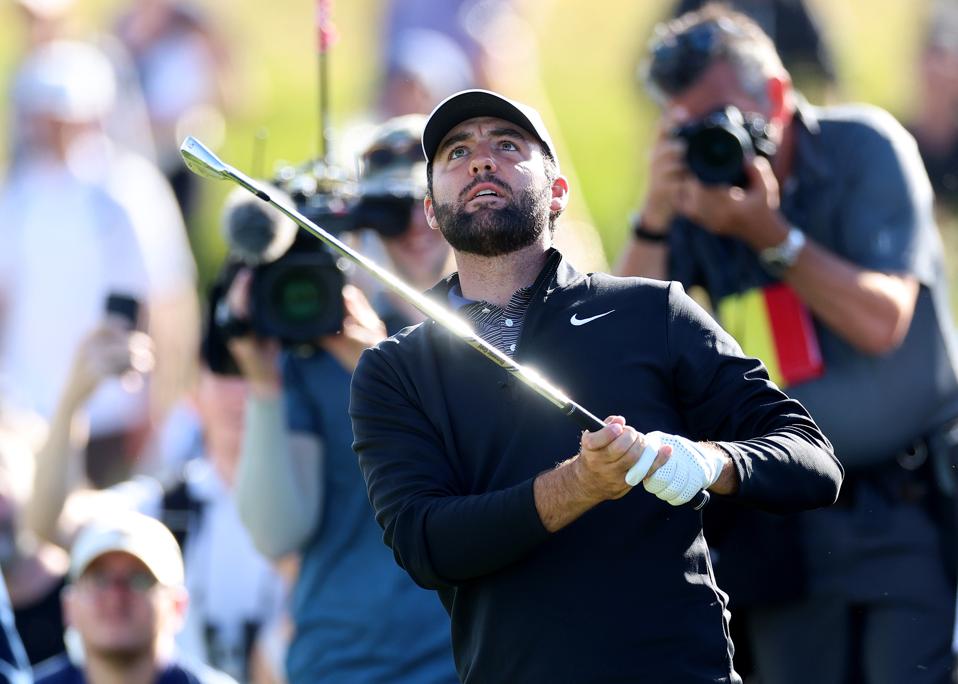The best golfer in the world just won his second major of the year—the British Open at Royal Portrush—and he did it with the kind of dominant performance we usually associate with legends.
But when Scottie Scheffler walked off the 18th green on Sunday, it wasn’t just another trophy that defined him. It was the baby in his arms, the kiss from his wife, and the quiet strength of a man who knows exactly what matters most. Scheffler’s mindset is where the real lesson lies.
Scheffler, still in his 20s and already a generational talent, was asked before the tournament what keeps him going, what fuels him to be the best. His answer wasn’t what most executives, entrepreneurs, or elite athletes typically say.
“There’s a lot of people that make it to what they thought was going to fulfill them in life, and you get there, you get to No. 1 in the world, and they’re like, ‘What’s the point?'” he told the media. “I really do believe that, because what is the point? Why do I want to win this tournament so bad? That’s something that I wrestle with on a daily basis.”
Scheffler’s honesty cuts deep and stands in stark contrast with the mindset displayed by some great champions like Tiger Woods and Kobe Bryant. In boardrooms and locker rooms alike, we’re taught to chase the next title, the next win, the next peak. But what if that’s not the summit that brings meaning? What if we’re climbing the wrong mountain?
For business leaders, that question isn’t just philosophical—it’s strategic. If you don’t know your “why,” you’ll never lead with conviction, and your team will know it.
After besting the world’s best golfers time and again, Scheffler reflected on how fleeting that feeling can be. “If I win, it’s going to be awesome for about two minutes. And then we’re going to get to the next week and it’s gonna be like, ‘Hey, you won two majors this year. How important is it for you to win the FedEx Cup playoffs?’ We work so hard for such little moments.”
Every executive knows that sensation. You land the big deal. Close the quarter. Ring the bell. Then Monday morning comes, and we wonder, what’s next? The greats learn to enjoy the moment—but not to be consumed by it. Scheffler’s grounded nature reminds us that success should never be your only identity.
Scheffler grew up in Texas. When he won the Byron Nelson Championship in front of his home crowd, it felt like destiny fulfilled. But even then, the glow of victory didn’t last long.
“To win the Byron Nelson Championship at home, I literally worked my entire life to become good at golf, to have an opportunity to win that tournament,” he said last week. “And you win it, you celebrate, get to hug my family, my sister’s there. It’s such an amazing moment. And then it’s like, ‘OK, now what are we going to eat for dinner?’ Life goes on.”
That kind of post-win wisdom is rare and it becomes even more poignant when you watch Scheffler walk off the course with his wife Meredith and their young son, Bennett, after his British Open win. This wasn’t just a champion soaking in the applause. It was a father returning to his family.
“I love being able to play this game for a living. It’s one of the greatest joys of my life. But does it fill the deepest wants and desires of my heart? Absolutely not,” Scheffler said. “I love being a father, I love be able to take care of my son. I love to be able provide for my family out here playing golf, and every day when I wake up early to go put in the work, my wife thanks me for going out and working so hard. And when I get home, I try and thank her every day for taking care of our son.”
That’s the kind of gratitude we don’t often hear from top performers. But it might just be the most important kind. In business circles, we still hear echoes of that old mindset: leave your personal life at the door. But that thinking is rightfully changing. Forbes contributor Roger Trapp recently looked at new research that shows how employees having supporting spouses can help businesses. “Spousal support enhances employees’ own capacity to help others in the workplace,” Trapp wrote. “This can make them more valuable team members and help to strengthen the social fabric of their organizations.”
For Scheffler, that’s not a theory. It’s his lived truth. “I’m blessed to be come out here and play golf, but if my golf ever started affecting my home life or it ever affected the relationship I have with my wife or with my son, that’s gonna be the last day that I play out here for a living,” he said. “This is not the be-all, end-all. This is not the most important thing in my life. And that’s why I wrestle with, ‘Why is this so important to me?’ Because I would much rather be a great father than I would be a great golfer.”
In my years of interviewing champions, from Walter Payton to John Wooden, I’ve come to realize the ones who last—the ones who lead not just teams, but leave legacies—are those who build their lives on something deeper than the scoreboard. Scottie Scheffler is that kind of leader. He may be the world’s best golfer today, but he’s already something more important: a man who knows what matters.
In a world that puts hustle over home, and output over inner peace, that might just be his greatest win yet.

